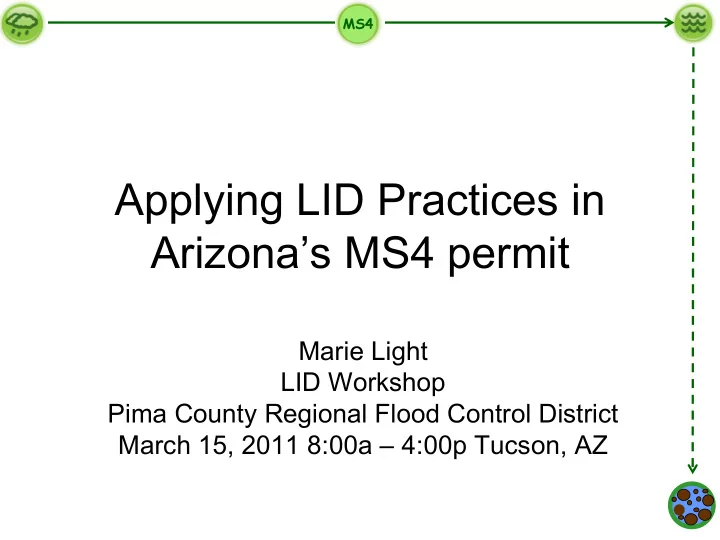

MS4 Applying LID Practices in Arizona’s MS4 permit Marie Light LID Workshop Pima County Regional Flood Control District March 15, 2011 8:00a – 4:00p Tucson, AZ
MS4 Applying LID in MS4 permits • Regulatory environment • Arizona’s Municipal Separate Storm Sewer System (MS4) Permit • Low Impact Development Practices • Areas of benefit and limitation • Next steps 2
MS4 Protecting the Nation’s Waters Constitution of Clean Water Act United States Pollution Prevention Preamble • Non-point Sources Article 1 • Point Sources Article 6 NPDES Arizona MS4 Pollutant Discharge Stormwater Elimination AZPDES AZPDES AZPDES point sources System Construction Industrial MS4 3
MS4 Portion of Hydrologic Cycle Regulated by MS4 Cloud Formation 4
MS4 Layout of an AZPDES MS4 outfall outfall Inflow Municipal Separate Storm Sewer System Outflow • Pipe ID > 12” • System owned by State, County, or • Pipe ID > 36” • Area > 2 acres City that discharges to waters of the US • Area > 50 acres • Collects or convey storm water • Catchment land use is industrial 5
MS4 Contents of an AZPDES MS4 SWPP o u t f a l l outfall Practices to prevent runoff from washing pollutants into local surface waters 1. Define control measures in Stormwater Pollution Prevention Plan (SWPPP) 2. Implement control measures • Education and training • Inspect: Outfalls, Construction sites & Industrial facilities • Survey illicit discharges • Monitor Water quality monitoring • Post-construction 3. Evaluate control measures 6 4. Modify SWPPP 5. Report Annual Results
MS4 Strong support for LID 1. Federal level – Watershed approach – Sustainability programs 2. State level (requirement in MS4) – Evaluate how LID can reduce pollutants • New construction • Redevelopments • Retro-fits of commercial and residential areas 3. Local level 7
MS4 Principles of LID related to water • Reduce volume of runoff: – Simulating natural runoff (& infiltration) – Reducing peak flows during storm events – Watering the ecosystem • Improve surface water quality by: – Using natural chemical processes – Using natural biological processes 8 NRDC, 2001
MS4 How LID benefits storm water management ↑ Interception ↓ runoff ↑ Transpiration ↓ runoff ↑ Sediment Removal ↓ Runoff ↑ Filtration ↑ Water quality ↑ Energy dissipation ↑ nutrient recycling ↑ water quality ↑ Evaporation ↓ runoff ↑ Infiltration ↓ runoff ↑ Soil rxn ↑ water quality ↑ microbial decomposition ↑ water quality 9
MS4 LID Reduces Runoff Coefficient 100 year flood event 100 year flood event 5 year flood event 5 year flood event 2 year flood event 2 year flood event Greatest benefit at Short return intervals 0 20 40 60 80 100 10 Percent Imperviousness City of Tucson, 2005
MS4 Areas Likely to see Benefits in MS4 • Roads with right-of-way available for LID • Parking lots • Roofs • Landscaped areas 11
MS4 Trees Accumulation ⇒ O&M • sediments Agaves, yuccas • heavy metals Shrubs Wildflowers Groundcovers Higher costs • Design/construct Grasses • O&M Cacti • plant care • cleanout sediments 12 Watershed Management Group, 2010
MS4 Next steps 1. Research urban system • soil chemistry in energy dissipation areas • Water chemistry of storm water for land uses • Residential • Commercial • Industrial 2. Refine designs 3. Refine plan review process for new features/functions 4. Develop cost comparisons for LID in arid environments 13
MS4 Summary 1. LID endorsed at federal level 2. Evaluation of LID is required in Arizona’s MS4 3. High capacity to improve • Flood control • Surface water quality 4. Next steps • Research • Refine designs and plan reviews • Develop support infrastructure 14
MS4 Contact Information Marie Light Pima County Stormwater Management Program Office: 520-243-7457 E-mail: Marie.Light@deq.pima.gov 15
Recommend
More recommend